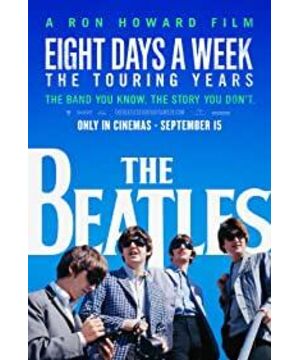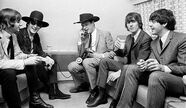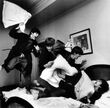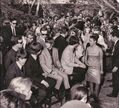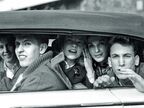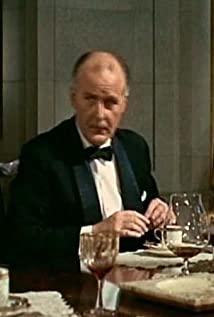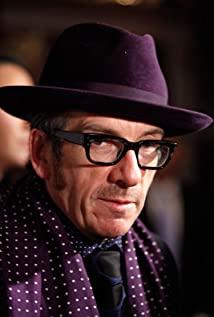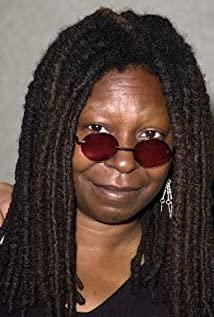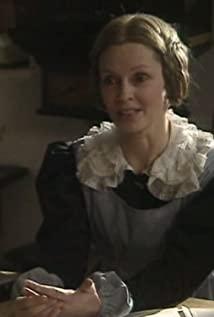In 1964, when broadcast reporter Larry Kane was invited to follow the Beatles in the United States During the tour, the 21-year-old boy who wanted to leave his name in the news history, the first reaction was to refuse.
His mother was very excited, "Oh, these boys will make a big move."
And his father carefully reminded him before he embarked on the journey: "Larry, be careful, they will bring harm to society."
Later, Larry left his name in the history of journalism as he wished. He was the only broadcast reporter to follow the Beatles tour. From 1964 to 1965, he accompanied the band across the United States. This experience later turned into several books in his writing, one is called Ticket to Ride, the other is called When they were boys. There is another book, Lennon Revealed, whose Chinese name can be translated as "Decrypted Lennon", written and published in 2005. When this book was published, it had been a quarter of a century since Lennon was shot and killed outside his Manhattan apartment on December 8, 1980.
After another ten years, the reporter whose destiny was completely rewritten by the Beatles turned to the camera and recalled the tour years of the year with a nice
voice : on the flight to the next place, the four big boys always He would walk to the front of the plane and squat down to chat with the bands that warmed them up-because these bands are often covered by the Beatles' stars;
Larry's mother died of cancer, he involuntarily confided to the four older boys. John Lennon was beside him gently comforting him-Lennon's mother had died in a serious car accident.
The unwillingness before embarking on the trip has long been smoothed out by the tender moments of coexistence. I believe that at some point, Larry regarded these four star-studded peers as his friends.
Long Howard, who once filmed "Beautiful Mind", wants to direct the Beatles documentary, which naturally makes people look forward to. However, his "Eight Days a Week: The Beatles Tour Era" is still based on many familiar video materials for music fans: the tour scene is so crowded that you can’t hear the live performances, and the Beatles just shake their heads. The girl who burst out screaming, the fans who burst into tears and even fainted because they couldn't buy the tickets, could almost squeeze people into the backstage exit.
For the young people who cherish their traffic through a classic song today, the "Beatles fever" that survived in black and white videos fifty years ago does not seem to have much real feeling now. What can really shorten the distance of time is the interviews with those who witnessed it that year.
The nun Hubi Goldberg in "Nuns Are Crazy" flashed in her eyes and recalled how she felt when she heard Beatles music when she was a child. For the first time, this black girl felt that she could be good friends with white people.
You mean you want to be white? My friend asked her incomprehensibly
no, I wanted to be a Beatle.
Because of the music of the Beatles, the world seems to have finally opened the door to a black girl regardless of race and skin color.
In 2014, Candy Leonard wrote a Beatleness: How the Beatle and Their Fans Remade the World. From a sociological point of view, this book studies the fanaticism of an era in which the Beatles were the faith. Some of the research conclusions in the book seem incredible today. For example, the first fascination with the Beatles was a group of elementary school students around 10 years old, and their fascination with the Beatles accompanied them throughout their lives. Another example is the image of combing the head of the pot, which is considered too "girly" in American society, and they are considered to be not as sexy and masculine as Elvis Presley. After being on the American song rankings due to fan promotion, there are still people who insist that the popularity of the Beatles will not last long. The 1960s was an era of great changes and constant events. Like Larry, who initially refused the tour invitation, no one thought that the four singing British boys could become a cultural phenomenon and influence for half a century-including the Beatles himself.
"Culture, forget it, we're just playing around."
Facing the camera, Ringo said with a grin.
Just like the great teacher Da Zhang who is popular on the Internet today, the four big boys from the working-class family of Liverpool have a near-genius level of wit when dealing with the media. Their natural reaction requires years of pondering and training for many talk show actors.
When they set foot on American soil for the first time, American reporters couldn't distinguish the four people in the Beatles, so they opened their mouths and asked Lennon "May I ask your name." Lennon politely stretched out his hand and shook his shook: "Hello everyone, I am Eric."
Perhaps the most successful aspect of "Eight Days a Week: The Beatles Touring Era" is that it allows everyone to see this group of big The boy brought the cuteness and inevitability of conquering the world with his inborn "poor", and put this "a little bit of a silly" boy under the background of the great era of the 1960s. That was the moment when the baby boom just started to make a sound after World War II. Like the Beatles, most of their parents had experienced the haze of World War II. Although the world is not as bad as it was 20 years ago, it is still full of messy noises.
Just before several British boys were about to set foot on American soil, Kennedy was assassinated and the civil rights movement intensified. No one could expect the Beatles to bring any change to this noisy era, but they did it in a real way.
A performance in the late summer of 1964 brought the band to the south of the United States, where apartheid was still in effect. When the band arrived in Florida, they were told that at the Gator Bowl stadium where the concert will be held, seats will still be categorized by race. In shock, the four Beatles did not hesitate to make the same choice: If there is segregation in the audience, they will refuse to perform.
In "Eight Days a Week", it was Kitty Oliver, a scholar who focused on the oral history of race, female, black, who came forward to recall this past. She went to the Beatles' Gator Bowl concert alone, surrounded by white people. "The white man closest to me is no more than 20 inches. I sit there, holding my arms tightly, being careful not to get too close or touch him, because I don't know what will happen." But when Ringo's drum rang, This sense of cramping disappeared. In two hours, she exhausted all her strength to yell and sing together with the tens of thousands of people on the scene. She said that the Beatles gave me a taste of freedom for the first time. According to data records, the Beatles’ concert was the first performance in Florida without segregation.
Although as Fan Tong said, "The Beatles who stopped doing live performances became the best Beatles", but the Beatles' live performances really changed the world.
View more about The Beatles: Eight Days a Week - The Touring Years reviews


